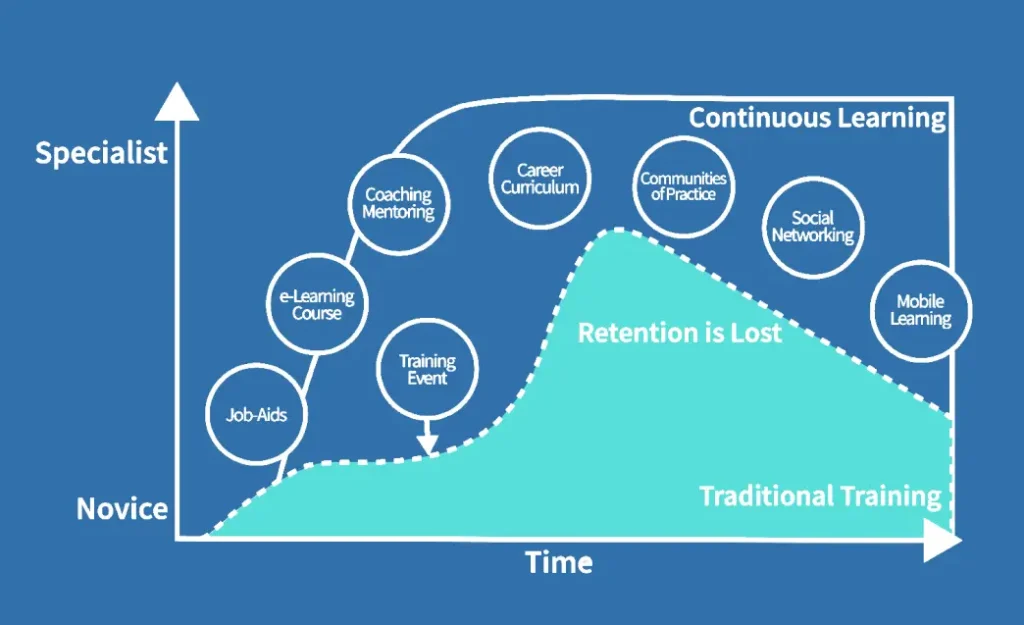In today’s rapidly changing corporate landscape, the pursuit of excellence isn’t just a goal—it’s an ongoing journey that requires embracing the concept of continuous learning. Much like Bersin by Deloitte’s model of perpetual improvement, the realm of professional growth thrives on a commitment to lifelong learning. In this dynamic environment, where innovation is the lifeblood of success, the ability to adapt and evolve through continuous learning has become a hallmark of exceptional individuals and thriving organizations.

Frameworks for Lifelong Learning:
- Kaizen: The essence of “continuous improvement,” Kaizen advocates for gradual, consistent progress. Dedicate daily time, however brief, to learning, ensuring a steady stream of knowledge infusion.
- The 5-Hour Rule: Emulated by luminaries like Bill Gates and Warren Buffett, allocate at least an hour each weekday to focused learning. Whether it’s reading, practicing, or exploring new horizons, this commitment fuels perpetual growth.
- The Pareto Principle (80/20 Rule): Channel your efforts into the vital 20% that yield 80% of results. Identify pivotal subjects or skills and concentrate your learning on these critical areas.
- Personal Learning Networks (PLNs): Forge connections with peers, mentors, and experts who share your passions. Utilize social media, online forums, and networking events to engage in enriching knowledge exchanges.
- Agile Learning: Inspired by agile software development, this method prioritizes adaptability and iterative progress. Break down your learning objectives into manageable steps, adjusting your approach as you glean insights.
- Mind Mapping: Visualize your learning goals and their interconnectedness through mind maps. This tool aids in comprehending the bigger picture while enhancing organization and retention.
- Deliberate Practice: Coined by psychologist Anders Ericsson, deliberate practice involves honing specific tasks for enhanced performance. Regularly challenge your boundaries with tasks that foster growth.
- Learning Styles: Identify your learning style—be it visual, auditory, or kinesthetic—and customize your strategies to optimize knowledge absorption.
- Mastery Learning: Immerse yourself fully in one subject or skill before transitioning to the next. This method promotes in-depth understanding and retention.
- Online Courses and MOOCs: Leverage platforms like Coursera, edX, and Khan Academy to access an extensive array of courses from global universities and experts.
- Reading Challenges: Set a reading quota to accomplish each year. This practice instills structure and nurtures consistent reading habits.
- Reflective Journaling: Capture your insights, thoughts, and learnings through journaling. Regular review of your entries fosters knowledge consolidation and growth.
As you embark on this journey, it’s important to be aware of potential obstacles and armed with effective strategies to overcome them. Here are some common challenges individuals might encounter along the way, along with actionable solutions:
Time Constraints: Balancing work, personal life, and learning commitments can be demanding. Overcoming this challenge requires effective time management. Prioritize learning by allocating specific time slots for it in your daily or weekly schedule.
Information Overload: In an era of information abundance, sifting through vast amounts of content can be overwhelming. Employ curated resources, focus on specific topics, and set clear learning objectives to streamline your efforts.
Lack of Motivation: Staying motivated amidst a busy schedule can be tough. Establish clear goals, visualize the benefits of learning, and reward yourself for achievements to maintain enthusiasm.
Procrastination: The allure of putting off learning tasks can be strong. Break down your learning goals into smaller, manageable tasks. Set deadlines and hold yourself accountable to avoid procrastination.
Learning Plateaus: Progress might slow down as you encounter more challenging concepts. Embrace the “growth mindset”—view challenges as opportunities to improve rather than setbacks. Seek help from mentors or peers if needed.
Distractions: Online distractions, social media, and other diversions can derail your learning efforts. Create a distraction-free environment, use website blockers, and employ the Pomodoro technique to maintain focus.
Financial Constraints: Professional courses and training programs can come with a price tag. Explore free or affordable online resources, scholarships, and employer-sponsored learning opportunities to overcome financial barriers.
Fear of Failure: The fear of not succeeding or not meeting expectations can hold you back. Remember that failure is a stepping stone to growth. Embrace challenges as chances to learn and improve, and celebrate small victories along the way.
Burnout: Juggling work, learning, and personal life can lead to burnout. Prioritize self-care, set boundaries, and know when to take breaks. A refreshed mind is more receptive to learning.
Resistance to Change: Adapting to new methods and technologies can be uncomfortable. Cultivate a curiosity-driven mindset and gradually introduce new tools or techniques into your learning routine.
Isolation: Learning in isolation can hinder motivation and progress. Join communities, forums, or workshops related to your field to connect with like-minded individuals, share experiences, and collaborate on projects.
Lack of Immediate Application: If you can’t apply what you learn immediately, it might feel less relevant. Maintain a learning journal to connect theoretical knowledge with real-life situations, enhancing its practical value.
Overcoming these challenges requires a blend of perseverance, adaptability, and a willingness to seek help when needed. Embrace each challenge as an opportunity to refine your learning approach and enhance your personal and professional growth.
As the Indian proverb wisely states, “Learning is the only treasure the thief cannot touch.”
This article was published by @Gaurav Suri on his Linkedin blog in September 2023
